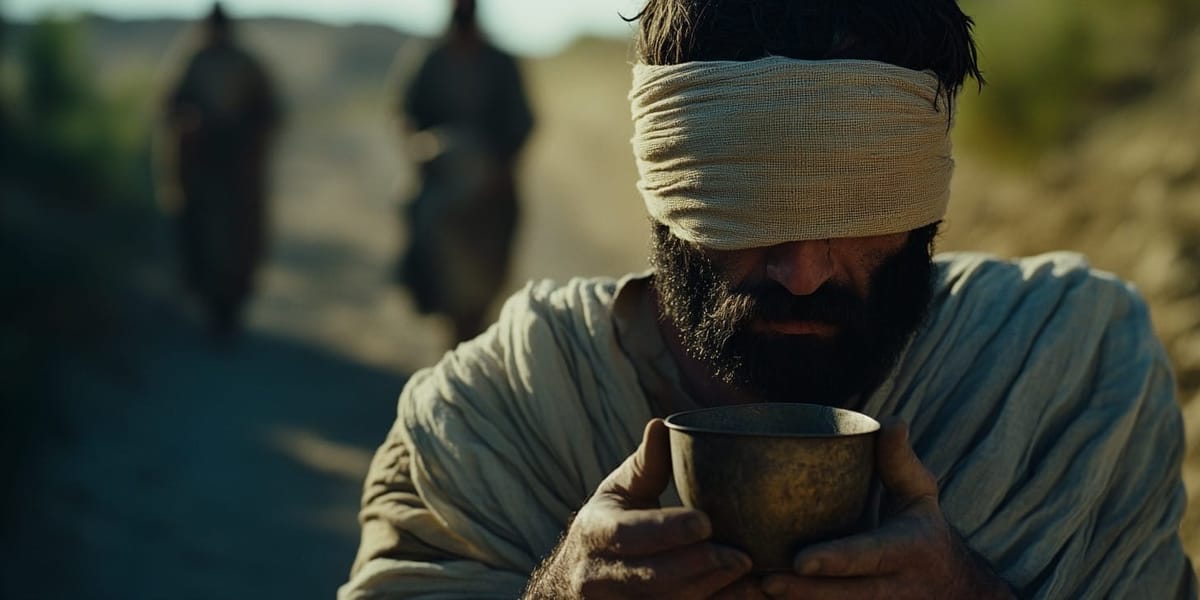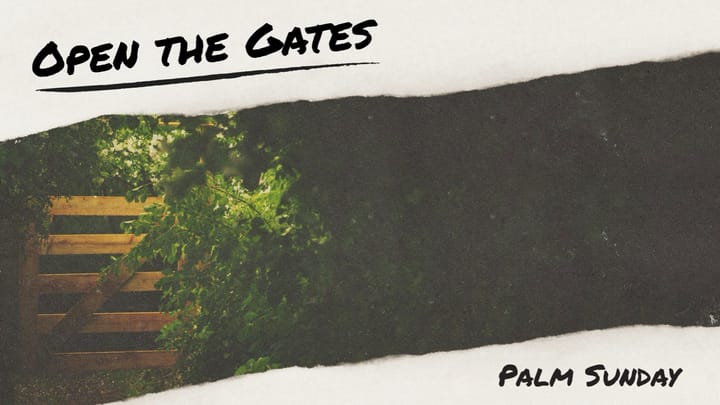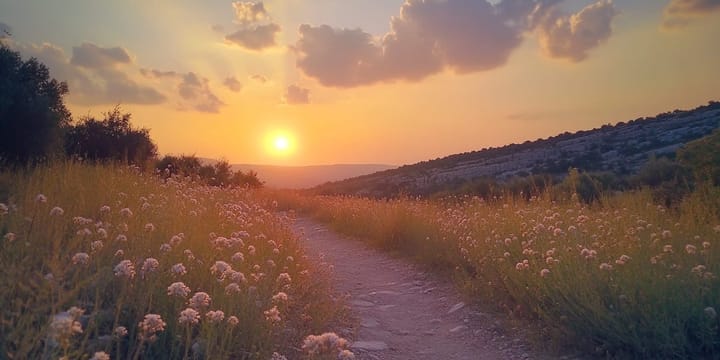Fairhaven Sermon 10-27-2024
Pastor Parson honored Gutiérrez's advocacy for the poor. In Mark, Jesus prioritizes a blind beggar (Bartimaeus). Parson urged us to love and act for the poor, identifying with them as Christ does.

In this week's service, led by Pastor Rev. Dylan Parson, we commemorated the life of Gustavo Gutiérrez, a Peruvian Catholic priest and theologian known as the 'father of liberation theology'. Gutiérrez challenged traditional Christian theology by emphasizing a 'preferential option for the poor', based on his experiences serving impoverished communities in Peru. He believed that God prioritizes the needs of the poor and powerless, a sentiment echoed in Methodism's focus on social justice.
This emphasis on compassion for the marginalized was demonstrated in today's Gospel reading from Mark, which tells the story of Bartimaeus, a blind beggar who humbly asked Jesus for mercy and was healed immediately. Pastor Parson highlighted that this 'preferential option for the poor' is not just a Catholic concept but a core aspect of Methodism and Christianity as a whole. He urged us to follow Jesus' lead in turning towards the poor and oppressed, acting with love even if our hearts aren't initially transformed. This radical transformation involves thinking, feeling, and living as Christ does, who is present in the alienated and exploited.
Transcript
So this week, a sort of personal hero of mine died at the age of 96. And I've actually been surprised for years that he's still been around. But that is Gustavo Gutierrez, whom you've probably never heard of, but he was a Peruvian Catholic priest and theologian who is known as the father of liberation theology. That was his kind of claim to fame.
And he was born and raised in Peru, where he went to medical school before realizing that his actual call was to be a priest. So he traveled to Europe and he studied at the best seminaries, the best universities in the world, under all kinds of big name scholars who shaped countless priests and other clergy in the 20th century, not to mention, you know, the entire Catholic and Protestant world through the reforms of Vatican II. Like what was happening in the European Catholic Church at this time ended up shaping the church through now. So whenever Gutierrez got back to Peru to serve the church, to serve in a local church, he found that much of what he had learned in seminary from some of these, you know, best scholars in the world was less than useful for him.
And here was his major issue. Christian theology, which theology is just the way that we understand God, the way that we talk about God, was at that time and is still largely shaped by affluent, educated Europeans and Americans. He was the first, you know, Latin American theologian to really get a voice around the world. And theology is shaped by the people who are sitting up towards the top of the global power hierarchy.
You know, the people who are at divinity schools at Harvard and Oxford, all these people who are really in a different place than the vast majority of the world, and they tend to make God into their image. But that's not who Father Gustavo found himself serving in Peru whenever he was in these lower and middle class neighborhoods in Lima. The vast majority of the population in Peru at that time was living in poverty, like 60 some percent, and most of those were in extreme poverty where they had, you know, barely any money or food to live on. And why that matters, why the theology that he learned is so different than that matters becomes very apparent when you think about it for a second.
So think about the words of Jesus in the Beatitudes. Think about Jesus teaching about the coming kingdom of God, and they mean something very different depending on how you hear them based on where you're sitting. So whenever Jesus said, Blessed are the poor, for theirs is the kingdom of God, do you hear that as hopeful words or as an indication that the kingdom of God might not belong to you because you're really not poor? It really matters how you hear Jesus based on how you sit. Gutierrez believed based on his reading of Scripture, and I think that this is one that's clearly correct, that God operates under what he and other theologians call a preferential option for the poor, and that is that the God of Israel from Genesis through Revelation in the world today prioritizes the needs and the well-being of the poor and the powerless.
And this preferential option for the poor, Wesley never used that term, but Methodism has always operated under the same kind of assumption, that God is in the slums, God's with the factory workers, the miners in those early days. This is not just a Catholic thing. But the point of it is that the job of the body of Christ then is to do the same, to prioritize the poor if we're going to be faithful followers of Jesus. So those of us who find ourselves in positions of relative comfort, relative power, are required to leave where we sit, like Jesus himself, and use all that we have, our power, our resources, our abilities, to live out our faith alongside those whom Jesus has still found, the poor, the disenfranchised, the suffering, the oppressed.
So in today's Gospel reading from Mark, we see a moment where this truth vividly comes to life in Jesus' walk in the world. So if there's ever anybody in the world who could be rightly called poor, Bartimaeus is that person. Bartimaeus is a beggar who sits on the road into Jericho. And he's not just poor, but he's essentially cursed for life.
He's going to remain in this helpless, hopeless position. He's unable to work. He's obviously unmarriageable because he has no means to support a family. And we can probably, by the fact that he's begging, safely assume that he has no family to help care for him.
He's alone. Mark doesn't tell us how Bartimaeus became blind or whether he was born this way, but those around him probably believed that it was due to his own sins or the sins of his parents. That's how you got some kind of infirmity like this in those days. You did something to earn it.
You must have. So he has no future. This is his fate forever. From now until he dies, he's going to be begging on that road to Jericho.
He's on his own. He's relying on the random generosity of other people. Even back then, that culture was a lot more communally focused than ours, but he is alone. So you can understand that Bartimaeus lives every day in this state of desperation, of constant uncertainty.
Is he going to eat today? He doesn't know. So perhaps over the previous few months as he's begged along the roadside, he passes hundreds of people every day, past him rather. He's overheard travelers talking about this interesting new teacher who's emerged out of the backwaters of Galilee. And this guy's been traveling all over.
He's getting reports from all over the place of people who've run into him, from Jerusalem to the tiniest villages, preaching about the kingdom of God, and people are saying, healing the sick, casting demons out of the possessed. And some people have even whispered that this guy has raised more than one person from the dead. So Bartimaeus, even as he just sits in his spot, has found himself putting hope in this man. He sounds like the Messiah that Bartimaeus knows from scripture, the one who's going to come to save his people.
And who needs saved more than Bartimaeus? So Bartimaeus must be shocked when one day word gets out that Jesus has come to Jericho. The man that he's heard stories about is almost guaranteed to walk right past him on the road. This is a once in a lifetime opportunity. So as Jesus is coming past, Bartimaeus just lets loose.
He tosses away any sense of politeness, of respectability, and he just screams, Son of David, Jesus, Son of David, show me mercy. And the crowds and the disciples are trying to listen to Jesus or get in with themselves, so they scold Bartimaeus to shut up, but he won't. And instead he yells louder, Son of David, show me mercy. And Jesus in that moment directs the people to send him forward, call him up, guide him to me.
So Bartimaeus throws his coat aside, which is the only thing that he probably owns, and he jumps up from the ground and he moves towards the sound of Jesus' voice. The crowd guides him up. And then Jesus asks the same exact question that you'll remember he asked James and John in last week's gospel reading. What do you want me to do for you? And Bartimaeus responds, Teacher, I want to see.
And in an instant, immediately his request is granted, his eyes are opened, and Jesus tells him, Go, for your faith has healed you. But Bartimaeus doesn't go. He sticks with Jesus. He decides to go with him.
He decides to go forth to follow him. Everything that he's ever wanted, this is it, has been given to him. So how can he not follow Jesus? And it's such a striking story to read right after James and John's request to Jesus. Remember that they asked to be seated in these places of highest honor in Jesus' kingdom.
But Bartimaeus, while also asking Jesus for something, could not have gone about it in a more different way. He's asking for something, but just completely differently. James and John approach it with this sense of proud entitlement. Teacher, we want you to do for us whatever we ask, they say.
But Bartimaeus cries out desperately, Son of David, show me mercy. And it's amazing, I think, how some random beggar who's never met Jesus understands him much better than those who have followed him for three years now, who have been with him day and night. But Bartimaeus understands Jesus better than they do. Maybe there's a lesson for those of us who have been in church for a long time.
Bartimaeus is not looking for luxury or comfort or power or authority or wealth. All he wants is to be freed from his ongoing suffering. Teacher, I want to see. And immediately, Jesus says, Your faith has healed you.
God has opened the way to this humble request from Bartimaeus. Well, you'll remember that Jesus says to James and John that he can't, he can't give them what they're asking for, even if he wanted to. And it's an incredible difference. Jesus is in this business of raising up the lowly and the suffering, not of helping his followers leverage their relationship with him into dignity, into celebrity.
He doesn't do that. But one of the most remarkable things in this story, and one that I sort of fixated on for the first time this time through, is the total 180 that the crowd makes once Jesus takes the lead. So all of these people, the disciples included, the disciples are not above telling people to shut up and go away, they do it pretty frequently in the Gospels. All of these people and the disciples are hissing at Bartimaeus to shut up as he's just screaming, Show me mercy, to Jesus from the ditch.
They want Bartimaeus to wait in line, to quiet down, to at least be polite, maybe know his place, stay off in the shadows where he belongs, where he can't make anybody uncomfortable. It's very likely, again, that they believe that he deserves his fate. Disability and illness were believed to be the result of sin. Bartimaeus was probably a sinner and that's why he's blind.
So why does he think that he should ask to be healed? But Jesus is the one who hears him, who stops and tells the people, Call him forward. And suddenly in that moment, they change their tune completely. The people's dismissal, their like scorn they had for him, transforms into excitement for Bartimaeus, whatever Jesus is going to do for him. They yell, Be encouraged, get up, he's calling you.
Now I don't know if that's like a miraculous and sincere transformation of their hearts that now they really love Bartimaeus, they want him to succeed, or just the people are just trying to get into Jesus' good graces. But to some extent, I don't think it really matters. Jesus takes the lead, the people follow, and they completely change their reaction to his suffering despite the suffering desperate person. And you and I are supposed to be doing the same thing.
We're expected to recognize Christ's face in the poor and the despised and respond accordingly. At the very least, we must recognize that Jesus expects us to do that and then act like it. Even if we don't immediately feel our hearts opening, again, I don't know if these people did, we're supposed to act like Jesus would. And then hopefully we start to feel it as the spirit works in our hearts.
And it seems like this preferential option for the poor that Jesus has is contagious. We follow Jesus' lead in turning towards those he loves, and then we find our actions with them change completely as Jesus works in our hearts. Jesus starts, we follow. And so turning once more to Gustavo Gutierrez, he insisted that this was an inevitable component of really being a Christian.
If we're converted to Christ, he writes, we should be converted to our neighbors. That's the phrase he uses. And here's how he puts it in his most famous book from 1971. A spirituality of liberation will center on a conversion to the neighbor, the oppressed person, the exploited social class, the despised ethnic group, the dominated country.
Our conversion to the Lord implies this conversion to the neighbor. Conversion means a radical transformation of ourselves. It means thinking, feeling, and living as Christ, present in alienated and exploited persons. And that's exactly what we see in this crowd at Jericho, isn't it? Conversion to their neighbor, this guy they never thought of as their neighbor, this guy they thought of as an object, as an obstacle.
They're converted to their neighbors. And you see the disciples turning away from this dismissive behavior that is absolutely in opposition to the way Jesus would respond, and they transform their action into what he tells them to do. If you believe in the Lord, you're going to act like the Lord, and he's the kind of guy who drops what he's doing to talk to and then heal Barmais. Again, conversion means a radical transformation of ourselves.
It means thinking and feeling and living as Christ. Through Jesus, we think, feel, and live like him, and as mysterious as this part is. Recognize he's not only living in us, working in us, through us, but is also in those people we encounter, especially those who are sick, exploited, poor, disabled, and/or oppressed. These are the people that God has chosen from the very beginning to prioritize, from this lowly country of Israel, all those kind of misfits and outcasts who composed it at the beginning.
These are the people for whom Jesus stops on his way, heals, and raises into new life. These are the people to whom the upside-down kingdom of God belongs. In the name of the Father, and the Son, and the Holy Spirit. Amen.


